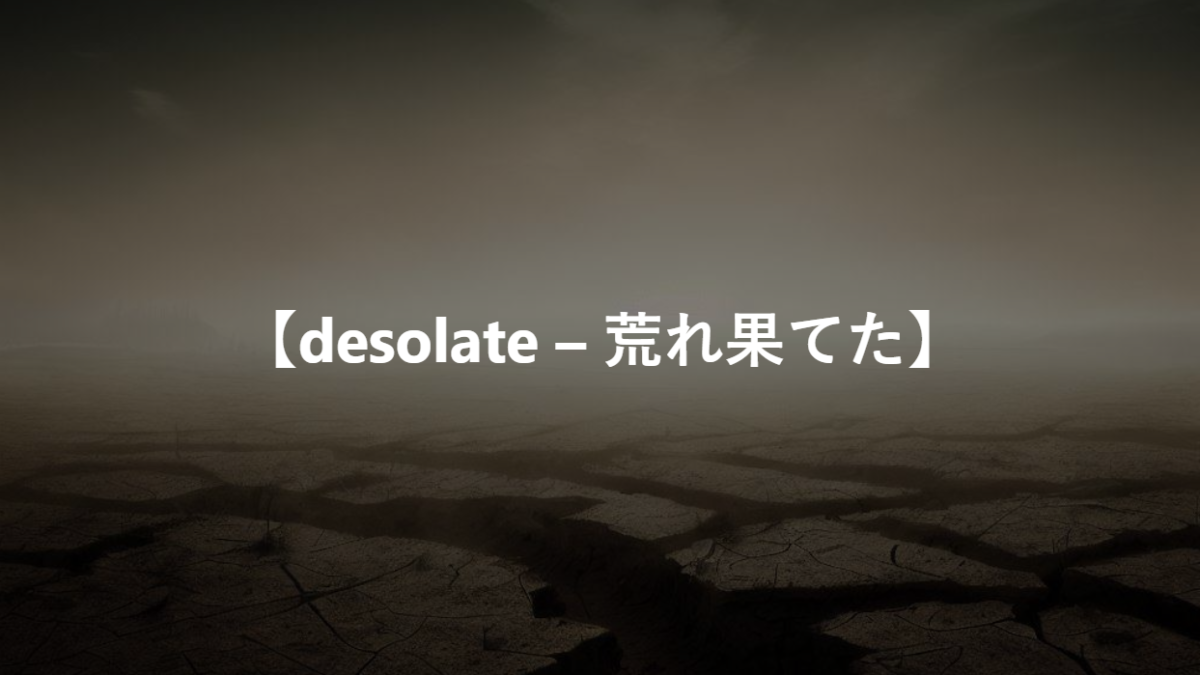Desolate /ˈdesələt/
荒れ果てた、寂しい、孤独な
場所が、人がおらず、空っぽで、荒涼としている様子。また、人が見捨てられたように感じ、非常に悲しく孤独であること。
「desolateな風景の中に、一つの美しさを見出す」
📚 意味と用法
desolate は、形容詞として、主に二つの意味で使われます。一つは、場所が「荒れ果てた」「人の住まない」様子を表します。生命の気配がなく、空虚で寂しい風景を思い起こさせます。もう一つは、人が深い悲しみや孤独感に苛まれている「寂しい」「打ちひしがれた」状態を指します。
荒涼とした風景 (A barren landscape)
It was a desolate landscape, with no trees or houses in sight.
(それは見渡す限り木も家もない、荒涼とした風景だった。)
深い孤独感 (A feeling of great unhappiness)
She felt desolate after her best friend moved away.
(親友が引っ越してしまい、彼女は寂寥感に苛まれた。)
🕰️ 語源と歴史
「Desolate」は、ラテン語の「desolare」に由来します。これは「完全に見捨てる」という意味で、接頭辞「de-」(完全に)と「solus」(一人の、孤独な)から成り立っています。”solo” や “solitude”(孤独)と同じ語源です。「完全に一人にされた」という元のイメージが、人のいない「荒れ果てた」場所や、見捨てられたような「孤独な」感情を表すようになりました。
🔄 類義語
⚡ 対義語
関連する対比
desolate (荒れ果てた) 土地は、fertile (肥沃な) 土地とは正反対です。同様に、desolate (孤独な) 気持ちは、joyful (喜びに満ちた) 気持ちとは対照的です。
💬 実践的な例文
The town was desolate and empty after the factory closed.
工場が閉鎖された後、その町は寂れて閑散としていた。
He felt utterly desolate when his dog died.
愛犬が死んで、彼は全くの孤独を感じた。
We drove through a desolate region of the country.
私たちはその国の荒涼とした地域を車で通り抜けた。
The house stood in a desolate landscape of rocks and sand.
その家は、岩と砂の荒涼とした風景の中に建っていた。
The feeling of desolation was overwhelming.
寂寥感は圧倒的だった。
🧠 練習問題
以下の空欄に入る最も適切な単語を選んでください。
1. An empty and barren place is described as ______.
解説:
空っぽで不毛な場所は、「荒れ果てた (desolate)」と表現されます。
2. The noun form of “desolate” is ______.
解説:
形容詞 “desolate” の名詞形は “desolation”(荒廃、寂寥感)です。
3. The opposite of a desolate landscape is a ______ one.
解説:
荒涼とした風景の反対は、「人口の多い (populous)」風景です。
4. After everyone left, she felt ______ and alone.
解説:
皆が去った後、彼女は「孤独で (desolate)」一人ぼっちだと感じた、という文脈です。
5. The root “solus” in “desolate” means ______.
解説:
語源で説明した通り、ラテン語の “solus” は「一人の、孤独な (alone)」を意味します。

